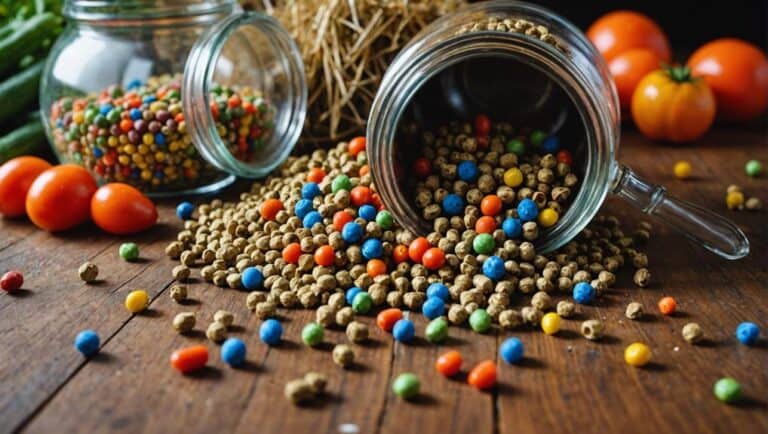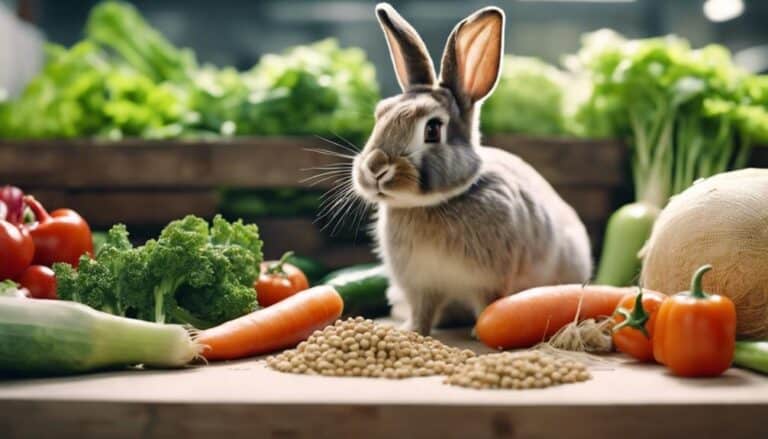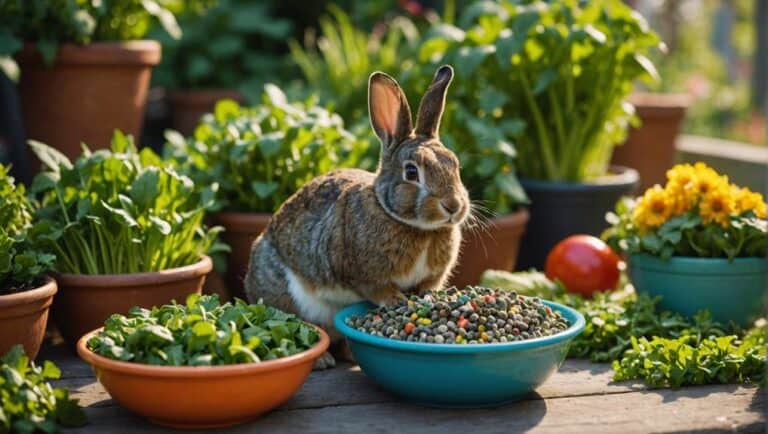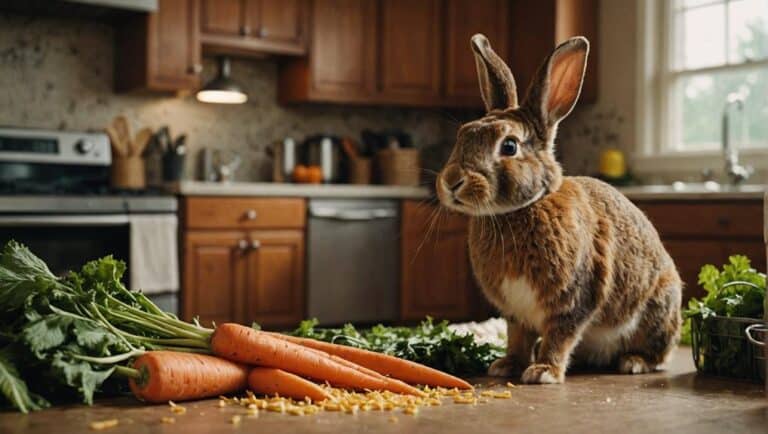Like a well-tended garden, your rabbit's health thrives on the right ingredients, particularly high-fiber snacks. You might wonder which options can best support their digestive system while keeping them engaged and satisfied. From leafy greens to delightful homemade veggie treats, each choice plays an essential role in their overall well-being. By exploring these snack options, you can guarantee your rabbit enjoys a balanced diet while avoiding potential gastrointestinal issues. Curious about the specific snacks that can make a difference?
Contents
Leafy Greens
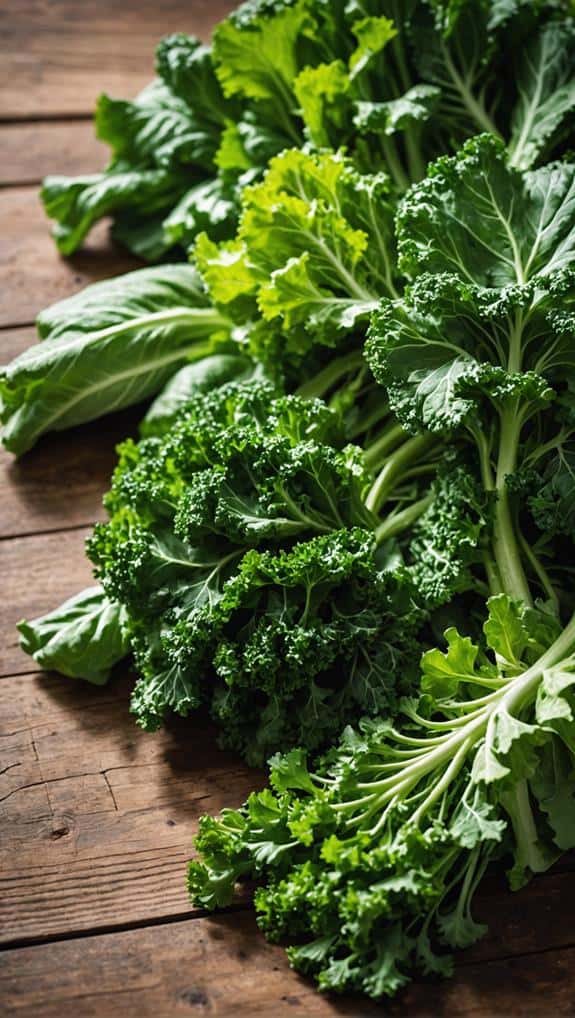
Leafy greens are fundamental for your rabbit's diet, providing important nutrients and moisture to keep them hydrated. These high-fiber foods support your rabbit's digestive health, aiding in the prevention of gastrointestinal issues. Safe options include dandelion greens, various types of lettuce (excluding iceberg), kale, and herbs like parsley and cilantro.
Each of these greens offers different flavors and textures, making mealtime enjoyable for your furry friend.
When serving leafy greens, consider the size of your rabbit. Small breeds typically need about one teacup per day, while larger breeds may require more. It's essential to balance quantity with nutritional content to guarantee ideal health.
Introduce leafy greens gradually into their diet to avoid digestive upset, as rabbits can be sensitive to abrupt changes. Monitor your rabbit for any adverse reactions during this shift.
Incorporating leafy greens not only provides crucial vitamins A, C, and K but also serves as a delicious, healthy treat that complements other vegetables like carrots. By prioritizing leafy greens in your rabbit's diet, you can enhance their overall wellbeing while making sure they receive the high fiber necessary for proper digestive function.
Dried Herb Blends
Dried herb blends offer a flavorful and nutritious addition to your rabbit's diet, enriching their meals while promoting natural foraging behavior. These blends provide essential vitamins and minerals, making them an excellent choice for high-fiber snacks that support digestive health.
Incorporating high-fiber treats into your rabbit's diet is critical for maintaining their overall health; high-fiber treats are vital to prevent obesity and dental problems. Here are some benefits of incorporating dried herbs into your rabbit's diet:
- Enhanced Flavor: Common herbs like parsley, basil, and mint elevate the taste of their meals, encouraging increased hay consumption.
- Digestive Support: The high fiber content helps maintain digestive health and prevents gastrointestinal issues common in rabbits.
- Variety in Diet: Introducing dried herbs gradually enhances dietary diversity, keeping mealtime exciting for your furry friend.
- Natural Foraging: Dried herbs encourage your rabbit's instinctive foraging behavior, allowing them to explore different flavors and textures.
When selecting dried herb blends, verify they're free from added sugars and artificial ingredients to support a healthy diet.
This thoughtful addition not only benefits your rabbit's health but also enriches their overall quality of life. Remember, a well-balanced diet is critical for your rabbit's happiness and longevity!
Timothy Hay Treats
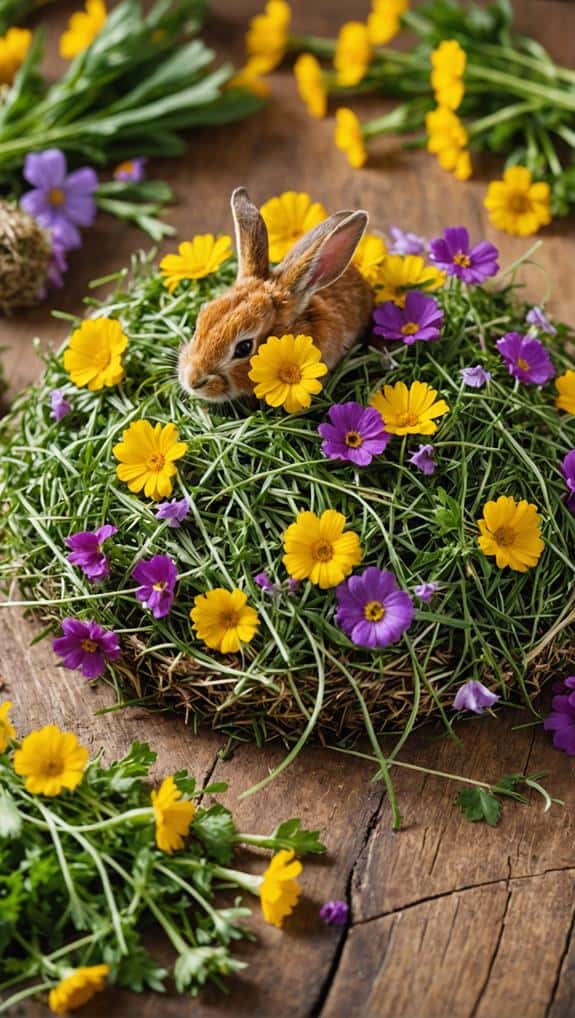
Timothy hay treats are a fantastic addition to your rabbit's diet, providing essential high fiber that supports digestive health. These treats aren't only beneficial for maintaining gut health, helping to prevent conditions like gastrointestinal stasis, but they also foster natural chewing behavior. This is imperative for dental health, as constant chewing aids in preventing overgrown teeth and minimizes the risk of dental problems.
In addition, incorporating leafy greens alongside these treats can enhance your rabbit's nutrient intake and overall well-being.
Moreover, timothy hay is lower in calcium compared to other hays, making it a safer option for preventing urinary issues associated with excessive calcium intake. Available in various forms such as hay cubes or compressed hay snacks, these treats add variety to your rabbit's diet while ensuring they receive essential nutrients without added sugars.
Incorporating timothy hay treats into your rabbit's daily regimen can also encourage foraging behavior, providing necessary mental stimulation that enhances overall well-being. By offering these high-fiber treats, you're not only promoting healthy digestion and dental health but also enriching your rabbit's life.
When it comes to caring for your furry friend, timothy hay treats are an excellent choice that benefits both their physical and mental health.
Fresh Vegetable Snacks
When incorporating fresh vegetable snacks into your rabbit's diet, it's vital to choose the right options and serving sizes.
Engaging in regular playtime strengthens the human-bunny bond, which can also encourage a healthy appetite for fresh snacks.
For small breeds, aim for about one teacup of leafy greens like kale or spinach daily, while larger breeds can handle more.
Remember to limit sugary root vegetables and monitor calcium-rich choices to maintain your rabbit's health.
understanding bunny behavior is essential for ensuring they enjoy their treats without developing biting tendencies.
Ideal Fresh Vegetables
Offering your rabbit a variety of fresh vegetables is essential for maintaining their health and well-being.
Incorporating high-fiber options into their diet supports digestive health and guarantees they receive the nutrients they need.
Here are some ideal fresh vegetables to take into account:
- Leafy Greens: Kale, spinach, and savoy cabbage are excellent choices. They're low in sugar and high in essential nutrients.
- Herbs: Fresh parsley, cilantro, and basil can provide flavor diversity and additional nutrients.
- Bell Peppers: These are colorful, crunchy, and packed with vitamins, making them a delightful treat.
- Cucumbers: Offering a rejuvenating crunch, cucumbers can help keep your rabbit hydrated.
Serving Size Guidelines
Rabbits typically thrive on a balanced diet that includes fresh vegetables, and understanding serving size guidelines is vital for their health. For small rabbit breeds, aim for about 1 teacup of high-fiber fresh vegetables daily. Larger breeds can handle more, but you should adjust portions according to their size and specific dietary needs.
It's important to introduce new vegetables gradually while maintaining existing daily amounts of greens. This approach helps prevent potential digestive upset, as rabbits have sensitive digestive systems.
When it comes to high-sugar vegetables like carrots, moderation is key; limit these to small amounts, roughly the size of your thumb. This guarantees that your rabbit enjoys a variety of vegetables without overloading on sugars, which can lead to digestive issues.
Always remember, fresh vegetables should complement a rabbit's primary diet of hay and pellets. By following these serving size guidelines, you promote a healthy diet for your rabbits, supporting their overall well-being and preventing any negative consequences related to overfeeding or improper food choices.
Hay-Based Chew Toys
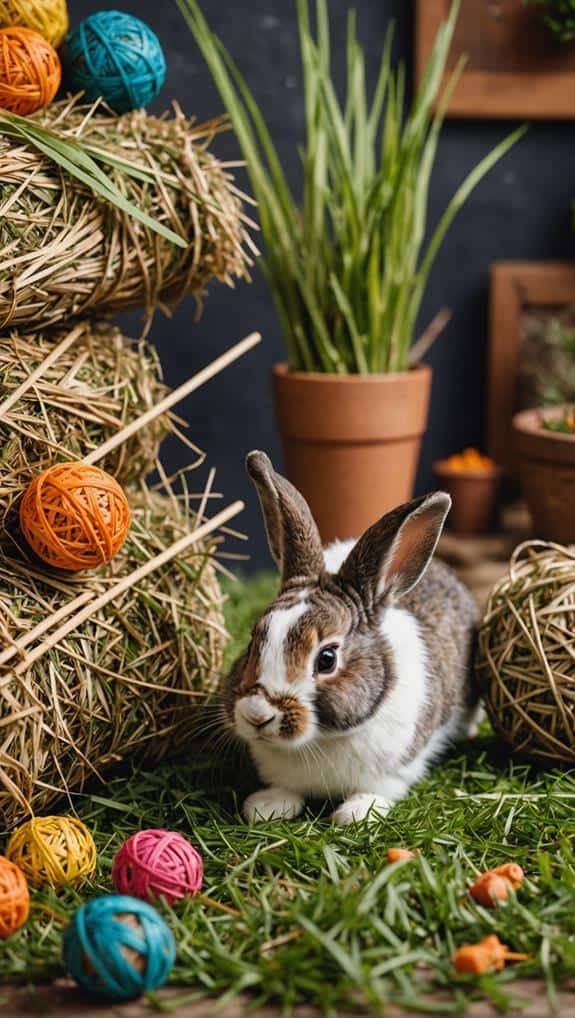
Providing your rabbit with hay-based chew toys is essential for their health and well-being. These toys not only satisfy their instinct to chew but also promote dental and digestive health. By incorporating them into your rabbit's environment, you support their overall emotional well-being.
Here are four key benefits of hay-based chew toys:
- Dental Health: Chewing helps wear down your rabbit's continuously growing teeth, preventing dental issues.
- High Fiber Content: These toys often contain high levels of fiber, vital for maintaining digestive health.
- Natural Foraging: Hay-based toys encourage natural foraging behaviors, enriching your rabbit's life.
- Boredom Prevention: They help prevent boredom and destructive behavior, keeping your rabbit engaged and happy.
Most hay-based chew toys are made from compressed hay or natural materials, ensuring they're safe and nutritious. Many are also fortified with added nutrients or flavored with safe herbs, enhancing their appeal.
Small Portions of Fruit
When introducing fruit to your rabbit's diet, keep portions small to prevent sugar-related digestive issues.
Ideal choices include apples (without seeds), bananas, and kiwi, but limit each serving to a thumb-sized piece.
Always monitor your rabbit's reaction to new fruits, as this helps you identify safe options and any sensitivities they may have.
Fruit Serving Sizes
Offering fruit to your rabbit can be a delightful experience, but it's important to keep serving sizes manageable. Excessive sugar can lead to digestive issues, so moderation is key. Aim for fruit serving sizes that are approximately the size of your thumb. This way, you make certain fruit remains a special treat instead of a dietary staple.
Here are some guidelines to help you serve fruit safely:
- Limit frequency: Offer fruit only a few times a week.
- Choose wisely: Opt for lower-sugar fruits like apples (without seeds), bananas, mango, and papaya.
- Be cautious: High-sugar fruits such as grapes and cherries should be given sparingly to prevent gastrointestinal upset.
- Introduce gradually: When you introduce new fruits, do so slowly to monitor any adverse reactions.
Safe Fruit Options
Choosing safe fruit options for your rabbit is essential to maintaining their health and happiness. While fruits can be a delightful treat, they often have high sugar content that can cause digestive issues if offered in excess.
As a general rule, limit fruit servings to about one tablespoon per 5 lbs of body weight. This guarantees moderation and helps prevent any gastrointestinal upset.
When introducing fruit, opt for small pieces. A thumb-sized slice of apple or half a banana is sufficient for your rabbit to enjoy the flavor without overindulgence.
Always avoid feeding your rabbit fruits with seeds or pits, as they can pose choking hazards and may be toxic, particularly in varieties like apples and cherries.
Introduce new fruits gradually to allow your rabbit's digestive system to adjust. This careful approach helps prevent any potential digestive complications.
Homemade Veggie Treats
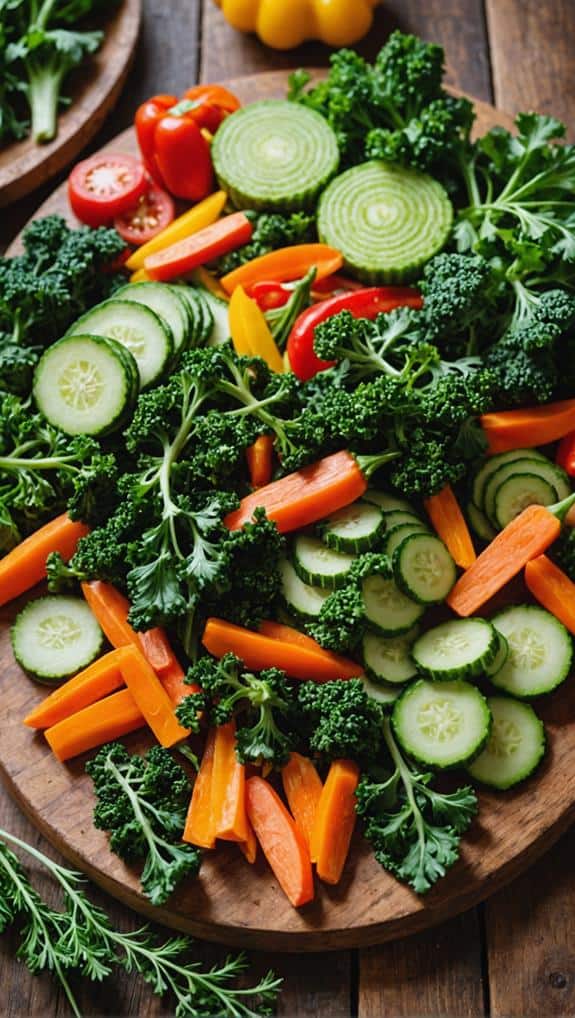
Creating homemade veggie treats for your rabbit can be a rewarding way to provide them with nutritious and tasty snacks. By using small quantities of safe vegetables like kale, spinach, and bell peppers, you guarantee your rabbit's diet is low in sugar and high in fiber.
Here are some ideas for making these delightful treats:
- Chopped Veggie Mix: Combine finely chopped vegetables with hay pellets to create a high-fiber snack that encourages natural foraging.
- Frozen Delights: Blend approved veggies like carrots and celery, then freeze them in small portions for a revitalizing treat during warmer weather.
- Veggie Mash: Cook and mash safe vegetables, then form them into small patties and bake lightly to create crunchy bites.
- Herb-Infused Treats: Mix herbs like parsley or cilantro into your veggie blend for added flavor and health benefits.
Always remember to introduce new homemade veggie treats gradually to your rabbit's diet.
Monitor for any signs of digestive upset or intolerance, and avoid high-sugar vegetables and ingredients like corn or beans, as these can cause issues.
Your rabbit will appreciate the effort you put into their health!
Final Thoughts
Incorporating high-fiber snacks into your rabbit’s diet can greatly enhance their health and well-being. Coincidentally, the more you diversify their treats with leafy greens, dried herbs, and hay-based options, the happier and healthier they’ll become. You’ll notice improved digestion and dental health, alongside a more active disposition. By gradually introducing these snacks, you not only prevent gastrointestinal issues but also create a dynamic feeding experience that enriches their lives. Prioritize their dietary needs for ideal health. Moreover, providing wholesome snacks for pet rabbits can strengthen your bond as they look forward to mealtime excitement. Experimenting with different textures and flavors keeps their interest piqued and encourages them to forage, fulfilling their natural instincts. Remember to always monitor portion sizes to ensure they maintain a healthy weight while enjoying these delightful treats.

